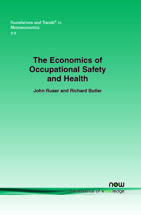The Economics of Occupational Safety and Health
By John Ruser, U.S. Bureau of Labor Statistics, ruser.john@bls.gov | Richard Butler, Brigham Young University, USA, richard_butler@byu.edu
Abstract
Economic incentives play an important role in occupational safety and health, affecting the behavior and decisions of workers, firms and government. This monograph discusses factors that affect workers' decisions about whether to choose risky jobs, how careful to be on the job, and how long to remain off work during recovery from injury. The monograph also examines occupational risk-related costs that influence the following safety decisions of a firm: wage premiums paid to attract workers to risky jobs, premiums for workers' compensation insurance, government fines for safety violations, and injury-related costs such as workplace disruptions and loss of worker specific job skills. This monograph also considers the influence of government, focusing on the enactment and enforcement of safety and health standards and the safety incentives of workers' compensation insurance systems. We find broad consensus in the empirical literature that workers and firms respond to economic incentives in making safety decisions. Economic incentives play an important role in occupational risk prevention. Sometimes these incentives improve safety; but, in other cases they have an adverse effect on safety.
The Economics of Occupational Safety and Health
The Economics of Occupational Safety and Health examines occupational risks that influence the safety decisions of a firm including: wage premiums paid to attract workers to risky jobs; insurance payments to injured workers including sick leave and workers' compensation benefits; premiums for workers' compensation insurance; government fines for safety violations and injury-related costs; loss of worker-specific job skills. The Economics of Occupational Safety and Health discusses the influence of government, focusing on the regulation of occupational risk through safety and health standards and the safety mandates of workers' compensation insurance systems. The authors find broad consensus in the literature that workers and firms respond to economic incentives in making safety decisions. Economic incentives play an important role in occupational risk prevention, but sometimes they have an adverse effect on safety. The Economics of Occupational Safety and Health reviews the theory of compensating differentials suggesting that wages increase with more job risk. The authors discuss incentives created by the workers' compensation insurance system both for workers and for firms. Next, this monograph discusses the modest impact of government safety inspections in North America. The authors conclude with some final observations on the impact of the business cycle and long-term effects on occupational health and safety.
